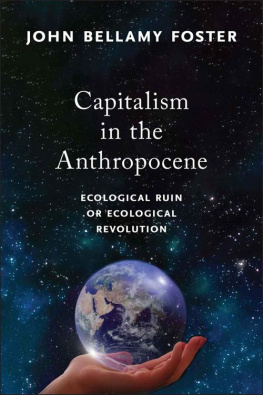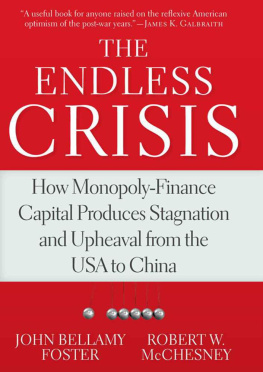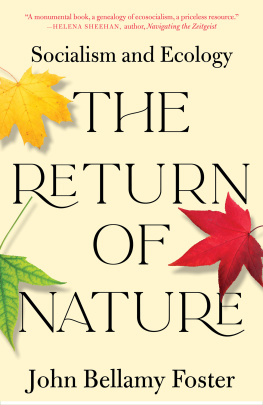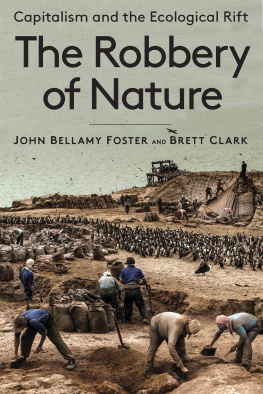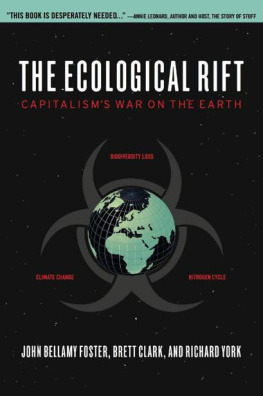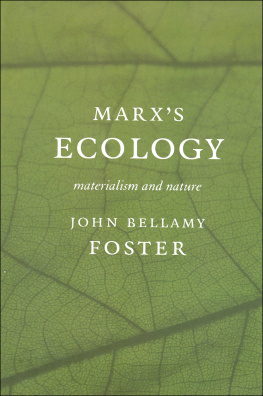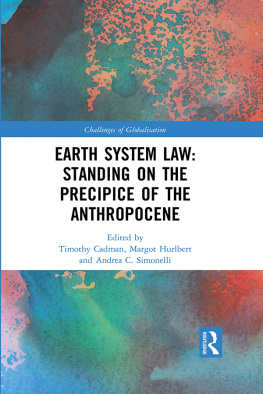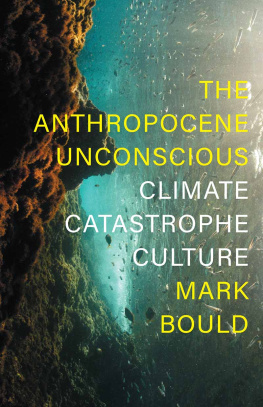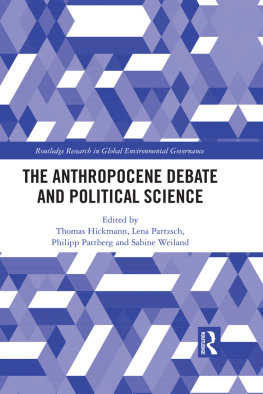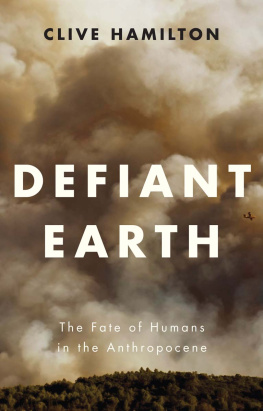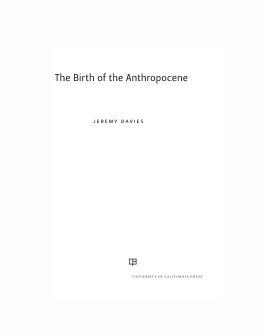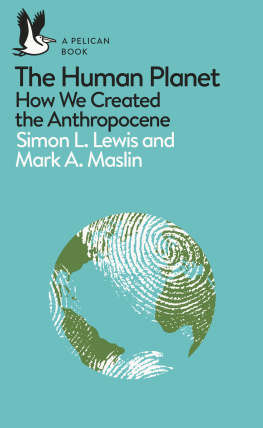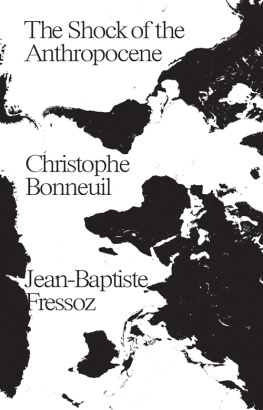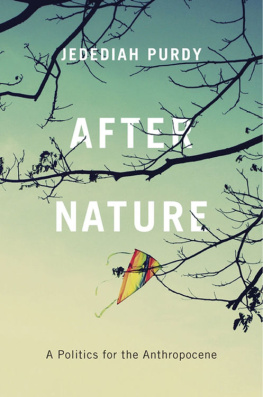CAPITALISMin theANTHROPOCENE
Ecological Ruin or Ecological Revolution
John Bellamy Foster

MONTHLY REVIEW PRESS
New York
Copyright 2022 by John Bellamy Foster
All Rights Reserved
Library of Congress Cataloging-in-Publication Data available from the publisher
ISBN 978-158367-975-3 (paperback)
ISBN 978-158367-976-0 (cloth
Typeset in Minion Pro
MONTHLY REVIEW PRESS, NEW YORK
monthlyreview.org
5 4 3 2 1
Contents
for Carrie Ann
Preface
This book is about the terrible reality of our times, in which humanitys future is being threatened by the capitalist system in which we live, now in conflict with the earth itself. But it is also a work of indomitable hope derived from knowledge of the strivings of human beings at critical moments in history. In 1919, Marxist philosopher Georg Lukcs declared that in revolutionary situations where the fate of the world hangs in the balance, the individuals conscience and sense of responsibility are confronted with the postulate that he[/she] must act as if on his[/her] action or inaction depended the changing of the worlds destiny. We live in the midst of such critical times today, and the quality and even existence of the human future will depend on the nature of our struggles, on our ability to reinvent the world by reinventing ourselves, and on our willingness to transform the destructive social conditions that surround us and threaten the futurenot only for the sake of current human generations and those still to come, but also for the sake of the majority of living species on the planet.
The question of capitalism in the Anthropocene is one that I first took up a little over a decade ago, in The Ecological Rift (2010), written together with Brett Clark and Richard York. The chapters in this book were all composed in the intervening years, and were aimed, in various ways, at the issue of capitalisms war on the earth. A central theme is the continuing significance in this respect of Karl Marxs classical theory of metabolic rift. All of the previously published writings incorporated into this book have been revised, adapted, and updated for the present volume, some of them extensively.
The book is divided into three distinct parts. Part One: The Planetary Rift addresses todays Earth crisis viewed through the lens of Marxian ecology. Part Two: Ecology as Critique is concerned with various environmental debates and with questions of history, theory, and methods. Part Three: The Future of History focuses on ecological (and social) struggles and possible pathways to a more sustainable world.
A number of chapters in this book are drawn directly from previously coauthored work. Crossing the River of Fire, Marxism and the Dialectics of Ecology, and The Capitalinian were originally coauthored with Brett Clark, appearing in the February 2015, November 2020, and September 2021 issues of Monthly Review, respectively. Hannah Holleman and I coauthored two chapters: Weber and the Environment, published in May 2012 in the American Journal of Sociology, and The Theory of Unequal Ecological Exchange, published in the March 2014 issue of the Journal of Peasant Studies. COVID-19 and Catastrophe Capitalism was coauthored with Intan Suwandi, appearing in June 2020 in Monthly Review. Alejandro Pedregral conduced the interview in .
Most of the research going into this book was undertaken while I was working on a number of other closely related books and research projects connected to ecosocialism, some in collaboration with other scholars. In 2011, Fred Magdoff and I wrote What Every Environmentalist Needs to Know About Capitalism, showing how the global ecological crisis is a product of capitalist society and requires for its solution the transcendence of the present world order. In 2016, I published, with Paul Burkett, Marx and the Earth, critically examining attempts by some ecosocialists to distance their analysis from classical historical materialism, rather than building on it, in an attempt to construct an ecological critique of the system. In 2020, Brett Clark and I published The Robbery of Nature, which was primarily directed at extending the metabolic rift analysis to issues of the expropriation of nature and human bodies (the corporeal rift), and questions of social reproduction related to gender and the environment. That same year I completed The Return of Nature, the product of twenty years of research, exploring socialist contributions to the development of ecological theory, principally in Britain, but also the United States, from the time of the deaths of Darwin and Marx, to the present.
Other ecological work and projects also overlapped with the writing of this book. The Anthropocene Crisis is a revised version of the foreword to Ian Anguss indispensable book, Facing the Anthropocene (2016). Third Nature appeared in Vijay Prashad, ed., Will the Flower Slip Through the Asphalt (New Delhi: Left Word, 2017). For a number of years, Brian Napoletano, Pedro Urquijo, Brett Clark, and I have been engaged in research on the spatial aspects of metabolic rift theory centered in geography, beginning with our article Making Space in Critical Environmental Geography for the Metabolic Rift in the Annals of the American Association of Geographers in 2019. Holleman, Clark, and I have produced a series of research publications, part of a book project, linking metabolic rift theory to concepts of expropriation and the question of the global environmental proletariat, including Imperialism in the Anthropocene, Marx and the Indigenous, Marx and Slavery, and Capital and the Ecology of Disease, published in the JulyAugust 2019, February 2020, JulyAugust 2020, and June 2021 issues of Monthly Review, respectively; along with Marx and the Commons in the Spring 2021 issue of Social Research. In 2017, I wrote a foreword to Magdoff and Chris Williamss pathbreaking Creating an Ecological Society (2017). Lastly, Lola Loustaunau, Mauricio Bentancourt, Clark, and I, building on Marxs observations on the nineteenth-century guano and coolie trades, coauthored an article titled Chinese Contract Labour, the Corporeal Rift, and Ecological Imperialism in Perus Nineteenth-Century Guano Boom, for the Journal of Peasant Studies (2021).
Robert W. McChesney and I as the closest of friends have worked together on and off and have influenced each other in numerous ways for nearly half a century. During the period that I was working on the research and writing that constitutes this book we coauthored numerous publications, including The Endless Crisis: How Monopoly-Finance Capital Produces Stagnation and Upheaval from the USA to China (New York: Monthly Review Press, 2012), which contributed to much of the political-economic analysis here.
In the last couple of years, I have gained immensely from a regular informal seminar on Marxism and philosophy with three extremely gifted philosophy PhD students at the University of Oregon: Kenny Knowlton, Oscar A. Ralda, and Chris Shambaugh. As my Monthly Review research assistant during the last year, Chris has played a major role in helping prepare this book for publication.
In addition to the above-named individuals, all of whom have affected the ideas in the book, I would like to thank others at Monthly Review to whom I am deeply indebted, including Susie Day, Jamil Jonna, John Mage, Rebecca Manski, Martin Paddio, John J. Simon, Camila Valle, Victor Wallis, and Michael D. Yatesall of whom I work with on a regular basis and whose influence permeates this work.

